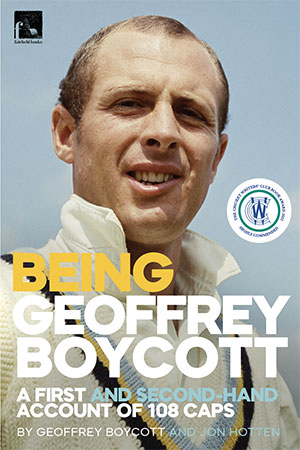This magnificent book is the product of lockdown. Finding himself without cricket for the first time in his life, Geoff Boycott sat down and began to type memories from each of his 108 Tests played, what his eventual co-author Jon Hotten describes, as 'retrospective diary of his Test match career', which commenced in June 1964 vs Australia at Nottingham, scoring 48 and in his final innings of the series, posted 113 at The Oval - his maiden hundred.
Jon Hotten believes "the diary will be a valuable resource for historians of the game in years to come. He hadn't begun with the idea of publishing, and at first, he just sent chunks to his wife Rachael to read. The fact that it's here now is a story in its own right, but a copy found its way to Matt Thacker at Fairfield Books, and he sent it to me, partly because he knew I was desperate to see it."
Boycott had an outstanding calendar year in Tests in 1971, aggregating 766, including four hundreds and three fifties, at an average of 109.42 in eleven innings. The sequence of scores in the first five Tests has been 77 & 142 not out at Sydney; 12 & 76 not out at Melbourne; 58 & 119 not out at Adelaide (all vs Australia) and 121 not out at Lord's and 112 & 13 at Leeds (all vs Pakistan).
His best performance in terms of run-aggregate in a Test series has been in the 1970-71 Ashes, amassing 657 runs at an average of 93.85, including two hundreds and five fifties, in ten innings. Watching his performance, Barry Richards, former South African cricketer, went on to say, 'he is the most dedicated player in the world and one of the greatest.'
When his career had ended in 1982, he had become Test Cricket's leading run-getter, managing 8114 runs at an average of 47.72, including 22 hundreds and 42 fifties, in 108 Tests. He must have missed another 30 possible appearances during an exile that began in 1974 and lasted until 1977.
A lot of things happened in his career, according to Jon Hotten - "being dropped after scoring 246 not out; captaining for four Tests; making a century in the first innings of his comeback match; scoring his hundredth first-class hundred during a Test against Australia at his spiritual home of Headingley; facing perhaps the fastest single over ever bowled, from Michael Holding in Barbados in 1981."
Hotten went on to add that "the diary conveyed the relentlessness of his professional life and his extrovert/introvert character. It had a direct objectivity and a high level of detail. Boycott has an astonishing memory, because, because I think the experience of playing cricket was for him the great love of his life. It took all of his physical and mental energy and it left a very deep imprint on him, one that he can tap back into."
In this enlightening book Boycott reveals a host of never-before-heard details regarding his peers and his playing days.
My friend, Andrew Samson, has meticulously compiled Boycott's Test career - country-wise and venues' wise.
The book, reasonably priced, is a must for cricket enthusiasts who are ardent fans of both cricket and Geoffrey Boycott. The black and white photographs are simply superb. An excellent production indeed!
|

